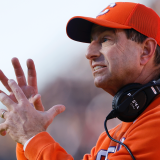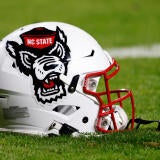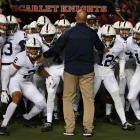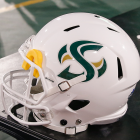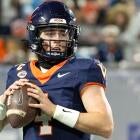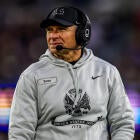Inside College Football: An apology to James Franklin, and awards voting requests
The entire process of voting for college football awards is way too rushed

I want to apologize to James Franklin.
I want to apologize for turning in my Bobby Dodd Trophy coach of the year ballot before Saturday. I want to apologize for feeling compelled to turn in my Dodd Trophy ballot before Saturday.
That's on me. I could have waited. I voted for someone else. I won't reveal who, but it wasn't Franklin, Penn State's charismatic leader who deserves to be the national coach of the year.
I could have waited until all the games were played, but I've been conditioned. Not many college football awards allow voters to wait for all the games to be played. That's what makes the sport different from MLB, the NBA and NHL.
That's also what makes the sport diminished. A quick check found that at least 15 of the 25 major individual college football awards out there reveal their finalists with at least two games left in the season.
That doesn't account for any bowls (an additional game) or playoff games (possibly two more). For the Dodd (no relation), we were asked to vote for finalists by Nov. 22 when some playoff coaches still had four games left on their schedule.
Some coaches have five-figure bonuses (at least) written into their contracts for such honors. We, the voters, don't make a dime. Letting the games play out seems to be is the fair thing to do for all parties.
There is an increasing credibility gap with these awards and their insanely early deadlines. The College Football Playoff adds up to two more games to the schedule for the nation's top players. In other words, the season isn't close to ending in time for these arbitrary deadlines.
But almost all of these awards worship at the altar of ESPN, which needs the winners in time for its awards show that airs this week.
That still doesn't explain why the 16 semifinalists for the Thorpe Award (best defensive back) were announced Oct. 24, only nine weeks into the season. One of those semifinalists -- Ohio State's Malik Hooker -- had seven games left in his season. There will be eight if Ohio State wins its playoff game.
I've suggested there eventually will be pressure on the Heisman to move its deadline back. To its credit, the Heisman Trust waits for the end of the regular season. But think how perceptions have changed of players who rise or fall in the playoff.
Beyond that, there is a case-by-case silliness that pervades. Last year, Oklahoma State defensive end Emmanuel Ogbah was a semifinalist for the Bednarik Award (national defensive player of the year).
But Ogbah couldn't win the Lombardi Award presented to the lineman of the year because he wasn't one of its 12 semifinalists.
Huh?
Two years ago, Arizona's Scooby Wright won every national defensive player of the year award out there. But he didn't make it as a finalist for his position for the Butkus Award (best linebacker). He had to be written in. He lost.
Had I waited on the Dodd, I would have been able to drink in Penn State's inspirational Big Ten win over Wisconsin. I would have included in my evaluation Franklin's impassioned plea for a playoff spot.
I would have included the Nittany Lions' rise from 7-6 to 11-2. It would have fully registered: It's OK again to cheer on Penn State football without feeling guilty.
But the list of Dodd semifinalists last month included three coaches with three losses. That list did not include Houston's Tom Herman, Willie Taggart (then at South Florida, now at Oregon) or San Diego State's Rocky Long.
I'm not saying any of those particularly should win. At the time, they should have been considered. Taggart posted the Bulls' best record (10-2) in the program's 20-year history. Long won back-to-back Mountain West titles at San Diego State.
You know how many other sitting coaches won outright back-to-back conference titles this year? Four: Clemson's Dabo Swinney, Alabama's Nick Saban, Oklahoma's Bob Stoops and Western Kentucky's Jeff Brohm.
Alabama types remain upset that All-SEC punter JK Scott wasn't selected as a semifinalist for the Ray Guy Award (best punter). They should be more upset the 10 semifinalists were released in early November with four games left in the regular season.
If you were a Biletnikoff Award (best receiver) voter, you couldn't vote for the nation's leader in touchdown receptions late in the season. That would be Western Michigan's Corey Davis. He wasn't a finalist. The Broncos' All-American-worthy receiver caught his 18th TD pass (to go along with 144 yards) Friday in the MAC Championship Game. But he was already out of the Biletnikoff running. The three finalists were announced Nov. 20.
One of them, Oklahoma's Dede Westbrook, had as many as three games left to play if the Sooners made the playoff.
Hey, who needs to watch football when there's a deadline to meet?
Heisman Trophy heist
A pair of players from the same school made it as Heisman finalists for the first time since 2004. That year, USC's Reggie Bush and Matt Leinart made it along with Oklahoma's Jason White and Adrian Petersen. Among those four are three Heisman winners. They're all hall of fame-worthy talents.
We'll see on Baker Mayfield and Westbrook, the two Heisman finalists this year from Oklahoma. While they had fantastic seasons, it's quite a leap to invite both to New York -- especially when no Alabama defensive player was invited from a unit that includes Jonathan Allen and four other future high-draft choices.
Sometimes I wonder if a large chunk of the 870 Heisman voters actually watch the game.
All-American boys
CBS Sports' 2016 All-America team will be released next week. Without revealing my full ballot just yet, here are five players who should be considered All-Americans by everyone.
Corey Davis, Western Michigan receiver: I thought he was a typical, undersized MAC receiver. Then I saw Davis was 6-foot-3, 218 pounds and a possibly draft worthy. As mentioned, Davis led the country in touchdown catches.
Zach Cunningham, Vanderbilt linebacker: There's something about a tackle machine that earns my admiration. Cunningham was a workhorse for the Commodores, finishing fourth among Power Five linebackers with 119 tackles.
Jabrill Peppers, Michigan linebacker: Make sure he's considered as a linebacker, not all-purpose. Peppers made it as a Heisman finalist but his output as an all-purpose player declined the last four weeks. Also, take a look at Curtis Samuel's game-winning run for Ohio State. Peppers overran it.
Cody O'Donnell, Washington State guard: The redshirt junior is the main reason quarterback Luke Falk was able to stay upright throwing the most passes in FBS the past two seasons. O'Donnell also made it as an Outland finalist.
Minkah Fitzpatrick, Alabama defensive back: The sophomore has had to play all over the field because of injuries. Right now, he is the glue that holds together a secondary that will be tested mightily in the playoff. Fitzpatrick has seven career interceptions. Four of them for touchdowns.
A final Power Five ranking
It's not how you'd ever expect the top five conferences to end up.
1. Big Ten: Rock star coaches, a playoff team for a third straight year (Ohio State), four New Year's Six teams. What's there not to like?
2. Pac-12: Back in the playoff with Washington. Half the conference won at least eight games.
3. ACC: A second straight playoff appearance for Clemson. A probable Heisman winner at Louisville. Eight of the 14 teams won at least eight games.
4. SEC: Every team but one (No. 1 Alabama) lost at least four games. A dearth of quarterbacks to the point that some question Alabama's secondary against a quality qb in the playoff. Auburn (8-4) is in the Sugar Bowl only because the contract says it has to take an SEC team.
5. Big 12: The first Power Five league left out of the playoff twice. Oklahoma was the only 9-0 conference champion but overscheduling (Ohio State, Houston) kept the Sooners out of the playoff. Two Heisman finalists for the Sooners. Baylor is a mess.



